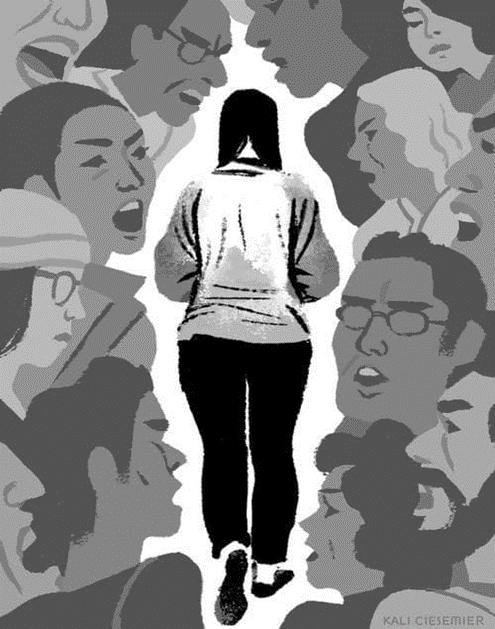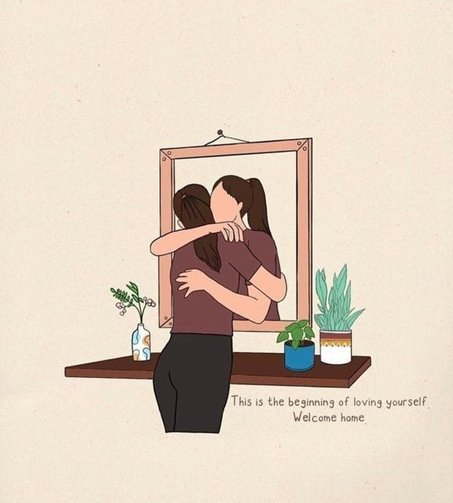This week has been quite a delight for me as I witnessed some amazing acts of courage. One of my juniors confided that she stood up to her bullies and told them to “stop pushing me and calling me fat”. One of my friends kept raving about how she went for a swim in her bathers despite feeling self-conscious and inadequate and being convinced that her body would be the standing joke for the other swimmers. A girl sitting beside me at the canteen kept chatting about how she feels insecure, yet, she said, she bought herself a burger and some fries and focused on enjoying it rather than worrying about the comments others may have about a person her size.
Experiencing these stories makes me so glad and proud to see the enormous courage of these people who are working towards accepting their bodies as they are. But after a prolonged period of self-reflection, I experienced a sting from the occhiolism which landed me in a strange descent from excitement to sorrow. In what form of culture do we live where it takes guts for three genuinely remarkable individuals to feel that they should be treated with standard dignity while they go about their daily lives, regardless of the physical form they inhabit?
A broad definition of body shaming is the act of disparaging or condemning one's physical characteristics. Body shaming is a long-standing societal practice that has been systematised and normalised. It begins at your house and, inexplicably, never stops. The body-shaming culture never seems to go away. It usually begins in childhood and has a significant role in our early years and school experiences. It is evident at family gatherings, at educational institutions, on social media, and even among our closest social groups.
Not only do we body shame other people, but we also frequently do it to ourselves with much more ferocity. Getting on a diet for that upcoming function, telling someone to "get back on track" after "letting go on that vacation", berating our bodies for being different, and sometimes even asking those we love the most to not look or touch certain areas of us. It is subtle yet extremely dangerous.
There is a common misconception that body shaming is only directed at people with bigger bodies when that’s not the case. Body shaming can be experienced by anybody, even those who fit in the stereotypical categories of “beauty”. Even Aishwarya Rai Bachchan, the Bollywood actress and winner of the Miss World Pageant 1994, whose facial features have been frivolously used to compare to somebody else’s facial features or inflating egos, has faced the brunt of it. Social media outlets ruthlessly tyrannized her for her weight gain post-childbirth, and she still faces comments on her body and how “graceful and slender” she used to look 10 to 15 years ago. Even the once-acclaimed ‘most beautiful woman in the world’ cannot escape the treacherous fangs of body policing and shaming.
You're either too tall or too short, too thin or too fat, too dark or too pale. The needs are never met, hence the comments never end. To satisfy society with how you look is something beyond herculean, for you have to survive the incessant beleaguering to fight back.

To get to the technicalities, here are some of the most commonly used terms that come under the body-shaming umbrella:
Lookism: This is the term used to describe the discriminatory advances towards those who are not conventionally attractive.
Food shaming: Ambiguous or direct gestures or speech directed towards how much a person eats or about their food choices. Suggestions to take up dieting, “you’re going for a second plate?”: a classic double entendre, etc. can be considered as this term.
Body privilege: A synonym for Pretty privilege, it is when individuals gain the trump card - social, economic, and political advantages - due to their physical appearance.
Texture shaming: This refers to the chagrin faced by individuals based on their hair and/or skin textures.
The pinning of such unrealistic body standards is what often leads to body shaming. The ineptitude to achieve the said standards unbridled our scathing, deprecatory side. In light of this, perpetrators of body-shaming are not limited to those around you; you could be your own worst critic. This equally means that those who body shame others could be going through a self-image crisis themselves. Nobody is the ideal size or shape. It is crucial to remember that most of the time, elements like our metabolism and genetic makeup determine our physical characteristics.
On a personal note, there is a good chunk of my social circle who finds some ambiguous form of entertainment involving themselves in throwing baseless comments towards people like myself, also throwing in a decorative comment of “keeping my best interests in mind”. There have been multiple instances where comments connoting my physical features have been weaponized as snide remarks and comebacks during arguments. When called out, usually with a hint of humor, the sarcasm goes devastatingly unrecognized by them. Not much later did I come to realize that the stereotypes and body policing are so deeply ingrained in their psyches, that there is little to no possibility of unlearning them. It is mostly ridden with a dangerously erroneous notion that somehow, pointing out our flaws and insecurities will "encourage" us to work towards changing them into something more easy on their eye.
Family members, especially parents, sometimes body-shame their children about the features that they passed onto their progeny, and that's when it takes a humorous turn. Logic doesn't find relevance in Indian family dynamics specifically, and the blame game is a lifelong battle of pelting stones to and fro in the name of love.
Though we can call out the double standards our families portray, we should never forget to remember that we cannot solely blame them for it. Personal opinion: they aren't the ones who should be carrying the burden of the guilt and shame of perpetrating such appalling stereotypes.
The villain in this story is the culture. The social environment. The status quo. Toxic beauty standards perpetrated by the Western culture have sculpted grotesque expectations, hence the thriving concinnity of ridiculous stereotypes slithers into the conscience of the human folk, and its glorification in pop culture only reaffirms these preposterous standards.
Nigerian author Chimamanda Ngozi Adichie stated, "Culture does not make people. People make culture”. Therefore, the cultural components of modern society—values, language, art, and what we see in the media— promote human viewpoints, some of which can be harsh, captious, and even extreme. For this reason, it's critical to question what the media portrays.
As our modern society takes shape, we need to redefine our values, identify what is right from wrong, establish gender equity, erect strong and just institutions, and prioritize the holistic well-being of all those around us with compassion. It is also very important to be kind to yourself and to not uphold your worth to your body type.
It takes courage to choose to stop participating in body shaming, and by doing so forge a better, brighter future for us all. As I culminate my monologue, my question to you, dear reader, is: Do YOU have the courage? My request to you: please search for it, hunt for it if you have to, and use it every day to your best.

References:
Oluyamo, T. (2023, June 20). The Ever-Increasing culture of body shaming. Kurerie. https://www.kurerie.com/blog/the-ever-increasing-culture-of-body-shaming


Comments